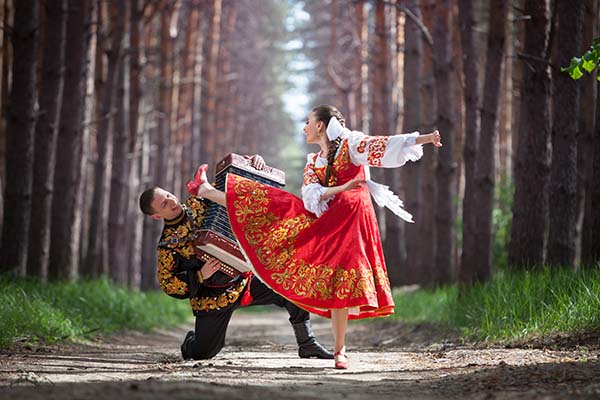
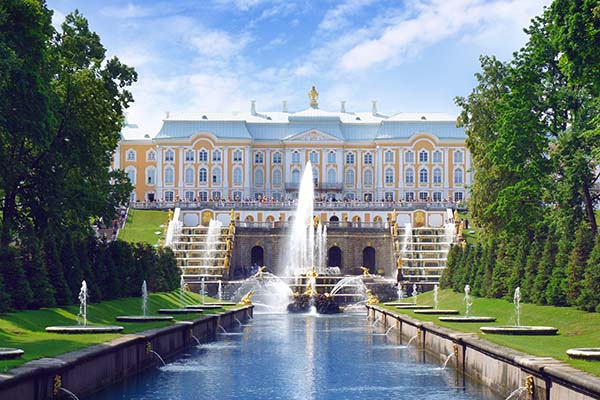
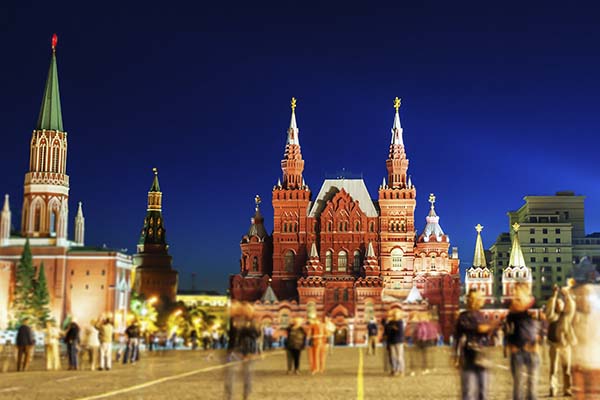
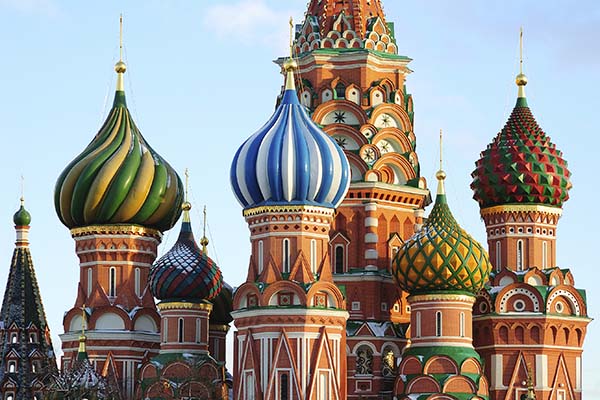

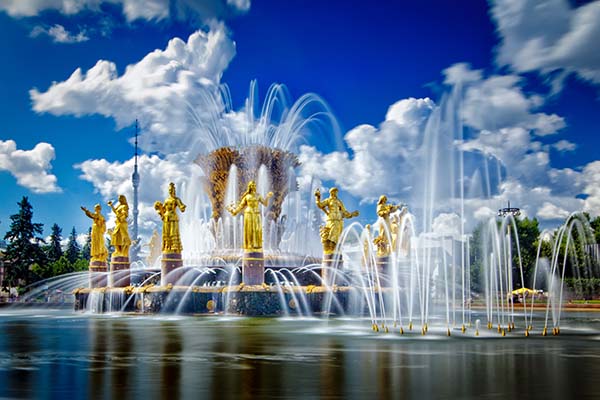
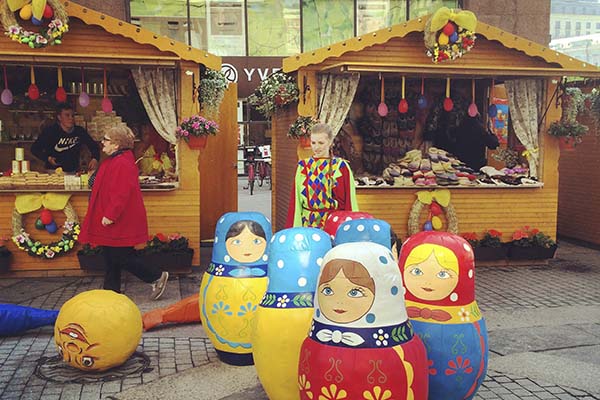
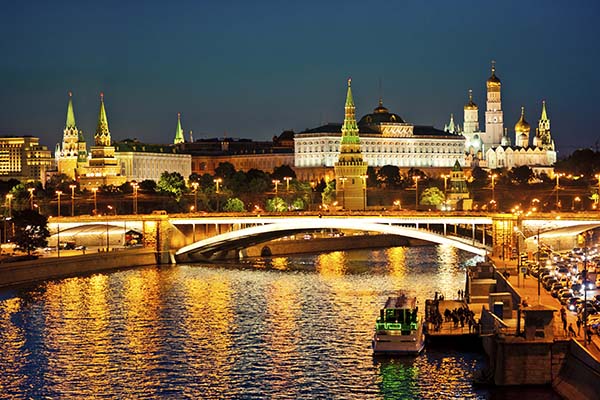
Russia
Once the powerhouse of the former USSR, Russia is awash with imaginative architecture and sprawling countryside. Russia is the largest country in the world, taking up one-tenth of the planet’s land, spanning 11 time zones with coastline on three oceans (the Atlantic, Pacific, and Arctic). Russia’s cities are probably the most popular attractions, but it’s vast landscape contains subtropical beaches, active volcanoes, and marsh jungles that compel you to explore. Timeless allures such as the Red Square, the Hermitage museum, and the Kaliningrad Cathedral are not to be missed either. Russia also holds the single longest railway in the world: The Trans-Siberian Railway, which stretches almost all the way across the country! Go ice-fishing in Lake Baikal, trek up to see eruptions at Kamchatka volcanoes, or attend the ballet at Bolshoi Theater. Known as a country of contrasts, you’ll be pleasantly caught off-guard by the diversity in art, scenery, and culture to discover in Russia.
Did You Know?
- No other country has as many borders as Russia. It shares a border with 14 countries, which are Norway, Finland, Estonia, Latvia, Lithuania, Poland, Belarus, China, Ukraine, Georgia, Azerbaijan, Kazakhstan, Mongolia and North Korea.
- There are nine time zones across Russia and is permanently on daylight savings time.
- Russian is one of the five top spoken languages in the world, and they use the Cryillic alphabet instead of the Latin alphabet.
- Russia is home to the largest McDonald’s restaurant in the world, which hosts 700 seats!
- For many Russians, it is tradition to wear your wedding ring on your ring finger of your right hand, instead of the left.
- There are approximately 10 million more women in Russia than there are men – and they estimate it’s because of the many men dying during World War II. It could also be partially due to the fact that 25% of men in Russia die before the age of 55!
- It’s considered bad luck in Russia to give an even amount of flowers to a woman, a tradition associated with funerals.
- Moscow has 74 billionaire residents, which is more than any other city in the world, beating the second-place city, New York, by 3 billionaires.
- In Moscow, their super fast metro system train has a train scheduled for every 90 seconds during rush hour. It’s estimated that over 9 million passengers ride it daily.
- It is believed to be a bad omen to shake hands over a doorway in Russia; their superstition is that it will lead to an argument.
- Lake Baikal in Russia is the deepest lake in the world, and contains about 20% of the world’s fresh water. About 1,700 species of plants and animals live in the lake, two thirds of which can be found nowhere else in the world.
- Russia has a very high literacy rate – with 99.7% of the population able to read and write by age 15.
- In the vault beneath the Monument to the Heroic Defenders of Leningrad, a metronome played out on local radio during the siege to assure residents the city was still alive, and it still steadily ticks today.
Travel Tips
U.S. Citizens must have a valid passport, with 6 months validity after planned return date, for entry into Russia. Most nationals also require two minimum blank pages, so you’ll need to get a new passport if yours doesn’t have enough. U.S. Citizens also require a visa and return ticket, plus confirmed accommodation and transit. It is advised to carry your visa with you on your trip, and your migration card (which you’ll receive and fill in upon arrival). You’ll also need to register your stay within three days of your arrival, and again at every new hotel when moving from city to city. There are some areas of Russia that have increased risk due to terrorism, and are not recommended for travel – so use the U.S. Travel Advisory for warnings. https://travel.state.gov/content/travel/en/traveladvisories/traveladvisories/worldwide-caution.html
To apply for a visa, contact the U.S. embassy for Russia. https://www.usembassy.gov/ For more information, contact your travel expert to guide you.
Russia is generally pretty cold, but because of the wide continental climate, the peak temperatures of around 65F can feel uncomfortably hot. The high season to travel is June to September, although the best combination of mild temperatures and lower crowds is in late-spring and early fall. You may want to visit St. Petersburg during their famous White Nights, when nights are as bright as the day! This usually occurs from mid June to early July, due to the geographical location of the city – which is the world’s most northern city with a population of over 1 million.
The official Russian currency is the Ruble. At one time it was easy to use the U.S. dollar in many areas, but that is no longer the case. Bring your credit and debit cards, but be aware that local cash currency is your best option, as not every merchant will accept credit cards. Use the local ATM machines when possible to get cash, or go to a bank to exchange U.S.currency or Travelers Cheques. Also to note that most exchange locations will require your passport for currency exchange.
There are approximately 261.9 million cellphones in use throughout Russia, and 42.9 million landlines – with over 1000 companies licensed to offer communication systems! Your phone will likely connect there, so contact your provider to check on the international plans available. However, you’ll likely save money and get more reliable service if you buy a local SIM card and prepaid plan with a provider in Russia. The top four carriers there are Tel2, Megafon, MTS, and Beeline. Wi-Fi is also widespread in coffee shops and hotels, and some major Russian cities offer it free. This means that Skype and other similar apps are another great option for phone or video calls over the internet.
Russian water system is not held to the same standards of sanitation as in the U.S., so it is advised that you buy bottled water for drinking and brushing your teeth.
Public transportation is widely available and inexpensive throughout most of Russia. The extensive metro train system is the best way to get around. Buses are good too, for places not covered by the train. And, of course, the Trans-Siberian railway is good for further distances across the country. When traveling on the Trans-Siberian railway, plan to dress in layers, and bring a hat and gloves, as it can be warm inside but chilly outside.